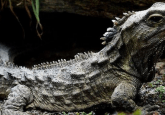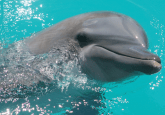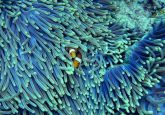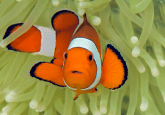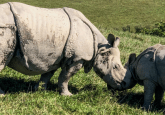Science in Fiction: an interview with Sue Pillans

Refer a colleague
As part of our ‘Science in Fiction’ series we spoke to Sue Pillans, marine scientist, graphic recorder and science communicator, about her passion for the ocean, the science in her books and the power of fiction to influence people’s attitudes and behaviors.
Would you like to tell us a little bit about yourself, your life before the Great Barrier Thief and how you got into fiction writing?
I’m an Aussie marine scientist and visual artist and combine my love of art and science to run my own business “Picture your ideas”, specializing in creative and visual communications. As a graphic recorder, science communicator and illustrator I help draw out information, ideas and issues to help make the complex simple and the simple compelling. I have always been ‘drawn’ to the ocean and love sharing science stories of the sea through my artworks. That’s how my alter ego Dr Suzie Starfish was created! Since commencing my business four years ago Dr Suzie Starfish has visited children of all ages bringing the living oceans indoors through the art and science of storytelling.
I have been drawing and creating stories ever since I was young but it wasn’t until I was doing my PhD research (in marine science) that I started watercolor painting classes. My art teacher would (and still does!) listen to all of my stories about my marine research and watch me paint crabs, jellyfish and all types of marine life, instead of painting the usual flowers and landscapes. She must have seen my deep devotion for the ocean and suggested I combine my love of marine art and science and create a children’s picture book. So I did!
Was writing and illustrating a children’s book a natural progression from your career as a graphic recorder and science illustrator? Or has it been something that you’ve been interested in doing as a separate project for some time?
I have been wanting to create a children’s picture book about the ocean since I started watercolour painting classes about 15 years ago. Over the past 10 years I have managed to write quite a few stories about the wonders of our underwater world, drawing attention to a range of issues from climate change and marine debris through to why our ocean creatures have such amazing features! All of my children’s stories are based on marine science with colourful, quirky characters who have many tales to tell…fishy tails that is!
The actual process of creating “The Great Barrier Thief” took six years as it was difficult to write a ‘happy ending’ for the impacts of climate change on the Great Barrier Reef and the process of creating picture books is a complex and lengthy one. Picture books take children on a journey, often opening their minds to another world, so the words and pictures need to entertain and excite. These stories also need to have hope and solutions, and despite the complexity of the issue the story also needs to fit within 32 pages.
I’m excited that writing and illustrating children’s picture books is now part of my creative business, rather than a dream I had and worked on in my spare time. Now that I’m a published children’s Author/Illustrator I can’t wait to dive in and publish the next book in my series of science in fiction picture books which will draw attention to the impacts of marine debris and ocean pollution, “Cranky Frankie: Oceans of Trash”!
19229
Clearly your passion for marine biology is a key inspiration for your book, what is it that attracts you to the ocean? Are there any other influences from science or other passions of yours that are reflected in the book?
The ocean is a place like no other on our Blue Planet. When you stick your head under the water you are diving into a world that is full of wonder and beauty. On the reef, you enter an underwater world that is bustling bright and full of life… that’s actually a line from my new book “The Great Barrier Thief”! I just love the reefs busyness, color and its noise. I tried to bring how I feel when I’m swimming on the reef into this book to illustrate to readers the beauty and diversity of our reefs so they also fall in love with it — as I believe if you love something you are more likely to want to look after and protect it.
My other passion is writing in rhyme! Even though most authors are told not to rhyme in their picture books (I don’t believe it’s a crime to rhyme!) I wanted the voices of the ocean to stand out and have their own personality. So there is a bit of my own personality scattered throughout the book along with splashes of my ocean optimism.
When creating the Great Barrier Thief, did you begin with the aim of informing children and their parents of the damages being inflicted on the reef, or did you start with the simple aim of writing a children’s book and naturally get taken in that direction?
The whole reason for creating this picture book was to make children and their readers (parents, grandparents, friends, teachers etc) aware of what is happening right now on our reefs. Not everyone is going to visit the reef in their lifetime or see the impacts of coral bleaching first hand, so it was important for me to write this story to illustrate, literally, the impacts of climate change on the Great Barrier Reef. My story includes the science, solutions and hope that no matter where you live or how old you are there are things that you can do today to help protect the reef for the future.
How important do you believe it is to ground science in fiction in reality and truth? How do you feel about it being used more liberally for the development of a more complex or exciting plot in other books?
Picture books are often the first books a child will be exposed to, so when it comes to the natural world I think it is important to tell children the truth, even if the reality is not a particularly pretty or pleasant one. In saying that, science in fiction can be told through positive storytelling to give children the hope and the solutions that they CAN do something to help. Storytelling is the oldest form of education so it can empower and excite readers of all ages and I have tried to bring the reality of climate change into the hearts and minds of readers with truth, positivity and solutions.
As our children are our future ocean stewards, I think it is important for them to know the truth about their Blue Planet as you are never too young to help make a difference and be the change you want to ‘sea’ in the world. Just look at the global action being taken by school students around the world at the moment regarding climate change. I believe picture books and other genres of books grounding science in fiction can be empowering, entertaining, exciting, engaging and importantly educating.
As a well-established member of the scientific community yourself, do you see the inclusion of science in fiction as an important service to potentially inform and inspire people to take more of an interest in science? Could it be a way of breaking through to those who are otherwise misinformed on scientific matters as a vehicle for social change?
Short answer, absolutely! Science in fiction can certainly inform and inspire people to take more of an interest in science, particularly if grounded in positive storytelling. My book is an example of this – even though the story is aimed at younger readers (4-10 year olds) I have been invited to read with children of all ages from kindergarten to high school students and a few adult readings as well! And the reaction, despite the ages, has been to start talking about the impacts of climate change immediately and discuss what the solutions might be. This reaction happens every single time I read the book, and it’s so inspiring.
Without a story that touches the hearts and minds of its readers the issue of climate change can be easily ignored as it’s deemed a global issue, but my story shows that each of us can do something locally to help protect the reef today and it is my hope that it helps in driving change. Change is hard, but science in fiction has the ability to inform and inspire change if the stories are relatable and reassuring to people.
Finally, when you read yourself, do you look for books that include well researched science, or are you looking for an alternative to the typical subject matter of your day to day job?
When I’m looking at children’s picture books, particularly about nature and our oceans, I’m always keen to ‘sea’ which ones are based on well researched science as they really speak to me. I think there is a need and space in the industry for more science in fiction books, particularly for our natural and underwater worlds. But when I get time for recreational reading, by the sea of course, I’m definitely into action and adventure and being taken into a different world to mine.
Please enter your username and password below, if you are not yet a member of BioTechniques remember you can register for free.
